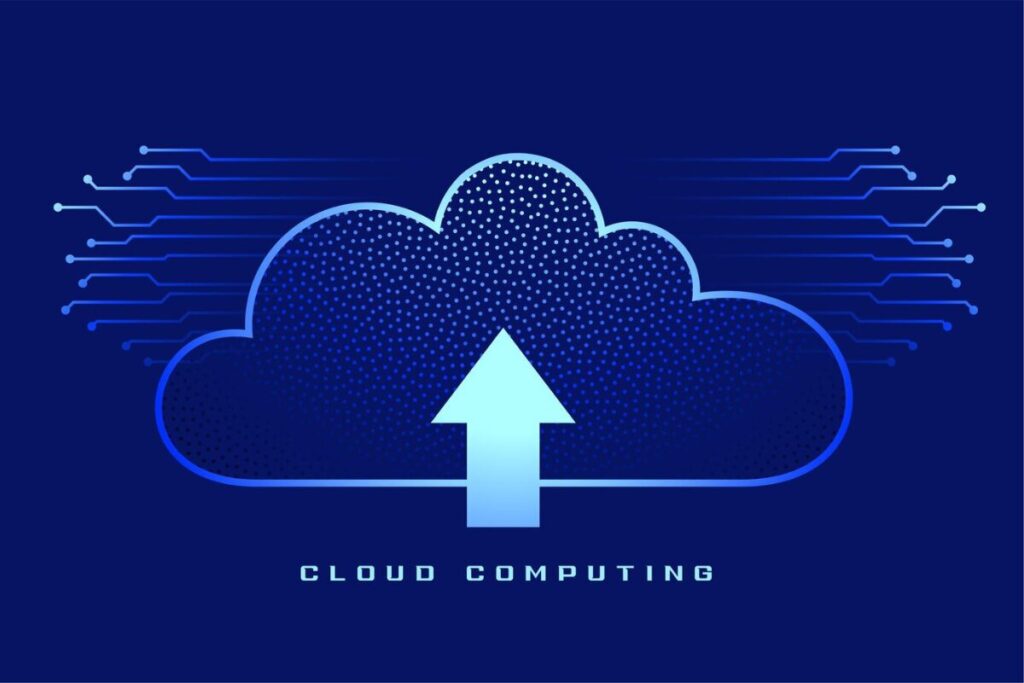Cloud computing is cost-effective because you’re no longer spending big on hardware or software, and those ongoing expenses like maintenance, upgrades, or even hiring a dedicated IT team vanish too. It’s not just about the upfront savings – with cloud resources, you get added perks like stronger cybersecurity and robust data recovery measures baked right into the service level agreement (SLA).
But it’s not just about saving money. With cloud services, businesses also get a boost in cybersecurity, thanks to advanced protections included in most service level agreements (SLAs). The same goes for data recovery — since your data lives in the cloud, it’s safer and easier to recover in case of an emergency. This combination of cost savings, enhanced security, and operational efficiency makes cloud computing a no-brainer for businesses looking to streamline their tech expenses while improving service quality. These key points also provide decision-makers with the insights they need to make an informed, strategic shift to the cloud.

What Exactly Is Cloud Computing?
At its most basic level, cloud computing refers to hosting IT resources—such as servers, storage, and applications—off-site, with access provided through the internet. Instead of maintaining physical servers and equipment in a local data center, businesses can tap into a cloud service provider (CSP) that handles all the heavy lifting. Whether it’s databases, email servers, or mission-critical software, all these resources are remotely managed and accessible from any device connected to the web.
This shift fundamentally changes the way companies operate. No more constant hardware upgrades, manual backups, or space-hogging server rooms. The responsibility of managing and maintaining IT infrastructure moves to the CSP, which offers businesses the freedom to focus on growth, innovation, and customer service rather than being bogged down by IT logistics.
What Can Cloud Computing Do for Your Business?
Cloud computing delivers an impressive range of IT services, all of which can be accessed remotely, just like you would with an on-site server. The difference? You’re not constrained by physical limitations. Whether it’s database management, running business intelligence (BI) reports, processing applications, or securely storing data, cloud services offer all the functionalities of a traditional server farm without the burden of ownership.
This flexibility allows businesses to scale their operations up or down depending on demand, optimizing both performance and cost. Moreover, it enables companies to experiment with advanced technologies like AI and machine learning without needing specialized hardware on-site. These services are provided on a pay-as-you-go model, which means businesses only pay for the resources they use, avoiding the high upfront costs typically associated with IT infrastructure.
Key Benefits of Cloud Computing for Businesses
When businesses embrace cloud computing fully, two main advantages quickly rise to the surface: significant IT cost reduction and access to data and applications from virtually anywhere. Cloud services don’t just save money; they also provide the flexibility to work remotely, support mobile workforces, and quickly adapt to changing business needs.
Moreover, security improvements are a big deal. Over 90% of businesses that switch to cloud computing report an enhanced cybersecurity stance. Why? Cloud providers offer state-of-the-art security measures, including encryption, regular patches, and compliance with industry regulations. This takes a massive load off in-house teams, ensuring sensitive data is protected without additional overhead.
The disaster recovery aspect is another big win. With business-critical data stored in multiple locations, companies are far better equipped to recover from unexpected disruptions, whether it’s a cyber-attack or a natural disaster. Beyond these key benefits, here are some additional reasons why cloud computing makes so much sense:
- 24/7 Expert Monitoring: Having IT experts continuously monitor your systems is pricey if done in-house, but it comes as part of the package with most cloud providers. With around-the-clock oversight included in your SLA, you get peace of mind without the extra expense.
- Scalability on Demand: Businesses often face fluctuating demand, especially in industries with seasonal spikes. Cloud computing allows you to scale your IT resources up or down automatically, ensuring you’re not paying for unused capacity during slower periods and have enough power during busy times.
- Seamless Mobility: Cloud services make it easy for employees to work from any device, whether it’s a desktop, smartphone, or tablet. This flexibility supports remote work and ensures that employees can access the tools they need, no matter where they are.
- Loss Prevention: With data stored across multiple locations, the chances of catastrophic data loss due to server failure or local disasters are minimized. Even if one data center goes down, the others pick up the slack, ensuring business continuity.
- Automatic Software Updates: Keeping software up to date can be a hassle, especially with the constant flow of security patches and updates. With cloud services, updates happen automatically, reducing the risk of security vulnerabilities and ensuring that your business is always running the latest versions of critical software.
- Global Access: Your business data is accessible anytime, from anywhere in the world, as long as there’s an internet connection. This ensures that your team can work efficiently, no matter where they are located.
- Reduced Downtime: Unlike local servers, which can lead to significant downtime if an issue arises, cloud services are designed for high availability. If one server or location goes offline for maintenance or repairs, others seamlessly take over, reducing the risk of interruptions to your operations.
- Staying Ahead of Competitors: Moving to a cloud solution gives businesses a leg up in terms of speed, cost, and innovation. You’re no longer weighed down by the time and money required to maintain physical servers and IT teams, leaving more room for strategic growth and investment in your core business functions.
Choosing the right cloud computing model is crucial, though. Different deployment strategies come with varied costs and requirements, so it’s important to find the right fit for your business. When done correctly, cloud computing removes the heavy burden of maintaining a local data center while delivering exceptional flexibility, scalability, and cost savings.

Understanding Cloud Computing Models
Cloud computing offers businesses unparalleled flexibility, allowing you to shift as much or as little of your IT operations to the cloud as you see fit. Whether you want to go all-in and move everything or selectively manage only critical systems, cloud models can be tailored to your unique business needs. Let’s explore the primary cloud computing models and how they differ in terms of management and responsibility.
Infrastructure as a Service (IaaS)
IaaS is ideal for companies that still want a level of control but without the headache of managing physical hardware. In this model, you are responsible for managing your operating systems, middleware, applications, and business data. Essentially, you take care of what runs on the infrastructure, while the cloud service provider manages the physical resources such as storage, networking, and servers. This model works well for businesses that want to scale their infrastructure up or down as needed without being tied down by physical assets.
Platform as a Service (PaaS)
With PaaS, more of the heavy lifting is handled by the cloud provider. They manage not only the hardware but also the operating system and middleware, so you can focus on your core business: developing and deploying applications. PaaS is particularly useful for developers because it provides a ready-to-go environment with everything you need to build, test, and launch apps. It’s a great way to speed up the development process while reducing costs tied to maintaining infrastructure.
Software as a Service (SaaS)
SaaS takes the simplicity of cloud computing to the next level by offering complete, end-to-end services that you access over the internet. With SaaS, you don’t have to worry about hardware, operating systems, or even the application itself beyond configuration and usage. The cloud provider manages it all, and you can access the software from any device with a web browser. Popular SaaS applications include things like CRM tools or payroll management systems. By eliminating infrastructure costs, businesses can shift their focus to using the software to drive growth without worrying about underlying technology.

Choosing the Right Cloud Deployment Model
Choosing the right cloud deployment model isn’t just a matter of technical preference—it’s about understanding your organization’s specific needs, security requirements, and operational goals. Here’s how to weigh your options when considering different deployment models.
Public Cloud Deployment
Public cloud is the most common deployment model, especially for businesses looking for cost-effectiveness and scalability. By utilizing the cloud provider’s infrastructure, you offload the burden of managing physical resources while retaining control over certain layers depending on your cloud model (IaaS, PaaS, or SaaS). One of the major benefits of public cloud deployments is the redundancy and reliability they offer. Data is stored across multiple data centers, often spread out geographically, ensuring your information is backed up and accessible even if one data center experiences an outage.
Another big advantage is the scalability of public clouds. Whether you need more storage, processing power, or network bandwidth, public cloud solutions can scale with the click of a button, making them a great fit for businesses experiencing rapid growth or unpredictable demand. The pay-as-you-go model also helps avoid large upfront investments.
Hybrid Cloud Deployment
Hybrid cloud offers the best of both worlds, combining the flexibility of public cloud services with the control of on-premise infrastructure. This model is particularly valuable for businesses that have strict regulatory or compliance requirements and need to keep sensitive data in-house while leveraging the scalability of the public cloud for less sensitive workloads. It’s a great solution for organizations with diverse needs across multiple lines of business (LOBs), where some departments may require higher security measures and others need more accessibility.
For example, a financial services company might keep its customer data in an on-premises data center for compliance reasons, but use a public cloud to host applications that interact with clients. The hybrid model allows IT managers to align resources precisely with their organization’s needs, balancing security and accessibility across different operations.
Private Cloud Deployment
Private cloud offers the highest level of control, making it the go-to solution for businesses that require full oversight of their IT environment. Whether hosted on-premise or managed by a third-party provider, a private cloud allows organizations to customize every aspect of their infrastructure, from hardware to security protocols. This model is often favored by industries with stringent regulatory requirements or those that handle highly sensitive data, such as healthcare or finance.
While private clouds offer excellent control and security, they can be resource-intensive. Maintaining a private cloud—especially one hosted on-site—means you’re responsible for not only the hardware but also the staffing, maintenance, and upgrades. However, private clouds do come with some public cloud benefits, such as self-service capabilities and automation. If needed, businesses can partner with an external provider to offload some of these responsibilities, though this may not be the most cost-efficient option for smaller companies.
Summary
Cloud computing has become a game-changer for businesses, offering cost savings, enhanced security, and operational efficiency all rolled into one package. From reducing the need for costly hardware and IT staffing to providing robust cybersecurity and data recovery options, cloud services empower companies to focus on what they do best. By offloading the burdens of IT management to a trusted provider, businesses can scale their operations and innovate faster, all while keeping costs under control.
When choosing the right cloud model, it’s essential to align your strategy with your specific business needs and goals. The right choice can make all the difference in maximizing your cloud investment. Whether you’re looking to enhance flexibility with a public cloud, maintain control with a private cloud, or strike a balance with a hybrid solution, there’s a cloud strategy that fits every business.
If you’re ready to explore how cloud computing can elevate your business while keeping costs in check, Contact Prosimo. Let us help you build a cloud strategy that’s fast, secure, and tailored to your needs.
Key Takeaways
- Cost Savings: Eliminates expenses on physical hardware, maintenance, and dedicated IT staff.
- Scalability: Easily scale IT resources up or down based on demand without long-term commitments.
- Enhanced Security: Benefit from advanced security measures included in SLAs.
- Disaster Recovery: Reduced risk of data loss with built-in backup and recovery solutions.
- Accessibility: Access data and applications from anywhere, promoting flexibility and remote work.
- Automatic Updates: Enjoy the latest software versions and security patches without manual intervention.
- Reduced Downtime: High availability and redundancy minimize operational disruptions.
- Flexible Deployment Models: Choose from public, private, or hybrid models to fit your specific needs.
- Innovation Enabler: Experiment with advanced technologies like AI and machine learning without the need for on-site hardware.
- Focus on Core Business: Offload IT management and concentrate on growth and innovation.
Frequently Asked Questions
- What is cloud computing?
Cloud computing involves delivering IT services such as storage, servers, and applications over the internet, eliminating the need for physical hardware and infrastructure. - How does cloud computing save costs for businesses?
It reduces expenses on hardware, maintenance, and IT staffing. Companies only pay for the resources they use, avoiding large upfront costs and reducing ongoing expenditures. - Is cloud computing secure?
Yes, most cloud providers offer advanced security features like encryption, firewalls, and regular updates as part of their service level agreements, enhancing overall security. - Can small businesses benefit from cloud computing?
Absolutely. Cloud computing offers cost-effective solutions that allow small businesses to access enterprise-level technology and scale as they grow. - What are the main cloud computing models?
The primary models are Infrastructure as a Service (IaaS), Platform as a Service (PaaS), and Software as a Service (SaaS). Each offers varying levels of control and management. - How does cloud computing improve disaster recovery?
Data stored in the cloud is often backed up in multiple locations. This redundancy ensures that businesses can recover quickly from disruptions like cyber-attacks or natural disasters. - What is a hybrid cloud model?
A hybrid cloud model combines public and private cloud environments, offering the benefits of both. It’s ideal for businesses with diverse needs and regulatory requirements. - How does cloud computing support remote work?
Cloud services allow employees to access data and applications from any device with an internet connection, making it easier to work remotely and collaborate in real-time. - Is cloud computing suitable for all industries?
Yes, cloud computing can be customized to meet the needs of various industries, from healthcare and finance to retail and education, thanks to its flexibility and scalability. - How do I choose the right cloud model for my business?
Assess your business needs, security requirements, and budget. Consulting with a cloud expert like Prosimo can help you find the best fit for your organization.
